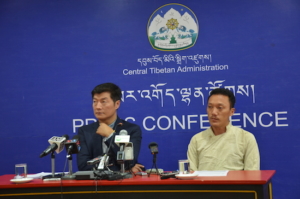Sikyong Highlights Peaceful Anti-Mining Protests at Minyak and Amchok, Denies CTA’s Involvement
DHARAMSHALA: Sikyong Dr Lobsang Sangay and Mr Tempa Gyaltsen, researcher at Tibet Policy Institute’s Environment and Development Desk, held a press conference today at Gangchen Kyishong to condemn the official circular issued by local Chinese authorities in Amchok, alleging Central Tibetan Administration’s involvement in the anti-mining protests in northeastern Tibet.
In response to the allegations, Sikyong Dr Lobsang Sangay argued, “The unfounded allegation made by the local Chinese authorities that the Central Tibetan Administration is partly engaged in the anti-mining protests in Tibet is simply unacceptable. These protests have happened because of the occupation of Tibet, repression of the Tibetan people and environmental destruction.”

Sikyong Dr Lobsang Sangay and Mr Tempa Gyaltsen, Researcher at TPI’s Environment and Development Desk at the press conference today, Lhakpa Tsering hall, DIIR, 8 June 2016.
“In the same circular, it was said that association or meeting of this kind will be punished and those arrested will be beaten and tortured. As per human rights law, everyone has the right to freedom of peaceful assembly. The right applies to peaceful protests and demonstrations, public and private meetings etc. Association of people at any level is inherent human right of every individual. Therefore, to have an official local circular which categorically declares punishment for peaceful protestors is against the human rights norm and hence, it is unacceptable.”
On top of human rights abuse, Sikyong strongly criticised the environmental abuses caused by the illegal mining activities in Minyak and Amchok area. “As far as Central Tibetan Administration is concerned, our environmental policy or principles are as follows: Any project related to environment has to to environmentally sustainable, culturally sensitive in the context of Tibetan people’s religious and cultural sentiment, economically beneficial to the local Tibetans and fourth it has be legal and in consent with the local Tibetan people of the area where the project is taking place. However, the mining activities in Minyak and Amchok are in clear violation of Chinese environmental guidelines and the four environmental principles of the Central Tibetan Administration.
“First of all, the extractions are illegal, there have been an increase in the number of cases of environmental degradation caused by Chinese mining activities in Tibet, Chinese government in general, local authorities and private corporations engaged in mining in the Tibetan areas have not sought the consent of the local people nor respected their religious sentiments and the developments have not benefited the local Tibetans,” he said, and strongly urged the Chinese government to enforce environmental laws on these projects and to reevaluate the treatment of the peaceful protests in Tibet.
Researcher Tempa Gyaltsen provided a detailed report on the environmental abuses as result of the two mining activities, cases of three self-immolation protests against mining activities and unjust treatment of the protesters by the local Chinese authorities. “Since 2009, there have been 30 recorded cases of anti-mining protests in Tibet and 2016 has seen the most number of protests than in the previous years. As of recently, Tibetans in Minyak Lhagang, Dartsedo County in Karze Prefecture held two-day protest against the Lichu river contamination caused by lithium extraction in the area. The mining were temporarily put at halt stating “environmental problems” and in order to “resolve remaining issues”. Last week, about 2000 Tibetans in amchok protested gold mining in the sacred mountain of Gong-ngon Lari, in Amchok town, Sangchu county, Kanlho Tibetan Autonomous Prefecture.”
“The Chinese government and the local authorities should take concern of the rising number of anti-mining protests by Tibetans and resort to better treatment of the situation, instead of discharging punishment. Two Tibetans from Amchok, Tsering Dhondup and Kunchok Tsering, have self immolated at the mine site to protest the unethical mining, similarly a Tibetan self-immolator named Tsultrim Gyatso, in his will, criticised Chinese mining activities at Tibetan holy sites,” he said, arguing that the suppression of the freedom of conscience and disrespect to the religious sentiments of Tibetan people have resulted in the protests.
Source: www.tibet.net


comment 0